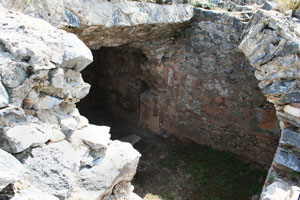The Philippian Jailer
Christian Baptism > John the Baptist • About Us
The Philippian Jailer and His Household
Acts 8:37 • Putting On Christ • Wycherley Critique
"Household Baptism" • GSB Observations
 Acts chapter 16, verses 30 to 34, is a wonderful testimony to the power of God touching a jailer and his household in the Macedonian city of Philippi.
Some commentators have suggested that verse 34 allows for baptism of infants in a believer's house. Let us examine this premise.
Acts chapter 16, verses 30 to 34, is a wonderful testimony to the power of God touching a jailer and his household in the Macedonian city of Philippi.
Some commentators have suggested that verse 34 allows for baptism of infants in a believer's house. Let us examine this premise.
Verse 31 reads, "Believe on the Lord Jesus and thou shalt be saved, thou and thy house". (Note that it does not read "Believe on the the Lord Jesus, and thou and thy house will be saved".) Verse 32 reads, "they spoke to him the word of the Lord, with all that were in his house". In verse 33, we read that these persons who had heard the Lord's word were baptised. "And he took them the same hour of the night and washed them from their stripes; and was baptised, he and all his straightway."
The translated Greek text for verse 34 reads literally: "bringing up and them to the house he set before a table and exulted whole-housely having believed God". The verb "believed" is singular (as is the verb "exulted"), and the Greek adverb "whole-housely" could refer to the preceding verb "exulted"1 or the following verb "believed".
- And having brought them into his house he laid the table for them, and rejoiced with all his house, having believed in God. (Darby Translation).
- And when he had brought them into his house, he set meat before them, and rejoiced, believing in God with all his house. (KJV).
- Now when he had brought them into his house, he set food before them; and he rejoiced, having believed in God with all his household. (NKJV).
- The jailer brought them into his house and set a meal before them; he was filled with joy because he had come to believe in God—he and his whole family. (NIV).
Some Bible translations such as the Geneva Bible, King James Version, New King James Version, NASB, and NIV apply "whole-housely" to the verb "believed"; other translations, such as Young and NRSV, apply the "whole-housely" adverb to the verb "exulted". J. N. Darby's English translation of this phrase is ambiguous. However, he writes concerning this passage, "Paul and Silas sing, instead of quietly sleeping; the doors burst suddenly open; and the gaoler himself is converted, and his family". He writes further, "We must not pass over in silence this energy which embraced whole houses, and subdued them to the christian faith". (Synopsis of the Books of the Bible, volume 4, pages 44-45).
JND was well-acquainted with New Testament Greek, and I believe that his Synopsis remarks accurately reflect the meaning of this passage: "the gaoler himself is converted, and his family". Clearly, verse 34, especially in view of the context in the preceding verses, cannot be used to justify including infants in household baptism.
Stephen Hesterman